Water for the world
How a pioneer of the social business world wants to supply safe drinking water to the rural poor
By THOMAS HÄUSLER translation from German by Karen Leube
Images by G.M.B. Akash

Paul Polak does not believe in conventional development aid. He fights poverty with the tools of the free market.
The portrait of a man who has changed the lives of millions. And who is now tackling his biggest challenge ever.
Safe drinking water is a human right. The United Nations General Assembly approved a resolution to this effect just last year. Bula Sahoo has not yet learned about this. Even if he had, it wouldn’t make any difference for him. The farmer lives with about a hundred other souls in Manikpur Patna, a tiny village in Eastern India. As is often the case, he is bothered by an upset stomach: “The water supplied by the hand pump in our village is foul,” Sahoo reports to a group of strangers standing around him, pestering him with questions.
An old foreigner with a baseball cap and a stained polo shirt tops all the others with his tenacity. No question goes unasked, for instance, how well the hand pump works, how often people here are sick from diarrhea, how much they pay for drugs.
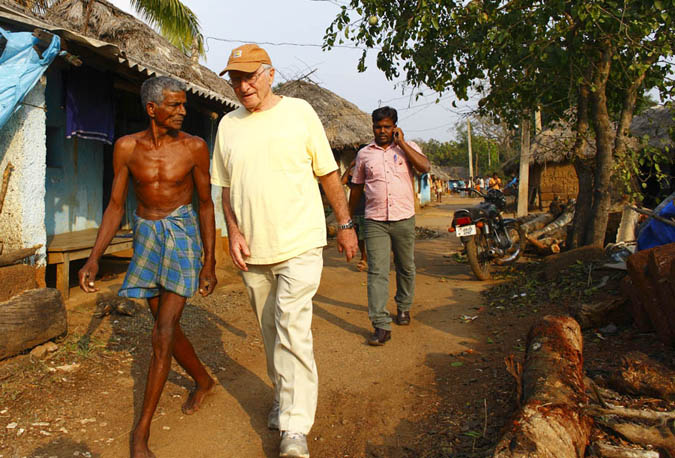
Paul Polak, the man with the cap, is very familiar with the problems caused by polluted drinking water, and, of course, he is aware of the UN resolution – but he doesn’t think much of it. “I am against human rights,” he declares with a smirk. “Well, not really, but as soon as human rights come into play, everybody calls for development aid. And it all goes downhill from there.”
Conventional aid has failed spectacularly in Polak’s view. “A trillion dollars has been pumped into sub-Saharan Africa – with what to show for it?” This huge sum of money was wasted, he says, because charity renders people lethargic, and because many aid projects are conceived by academics in air-conditioned offices in New York or Paris rather than by field workers who go to villages like Manikpur Patna and ask farmers like Bula Sahoo what they really need.
Criticism of this type has been leveled by others but few others have put their money where their mouth is the way Polak has: With his unconventional development projects, he has helped millions to escape poverty. The Atlantic Monthly named him one of the 25 bravest thinkers. Others who have made it into this prestigious group are Steve Jobs and President Obama.
At 77, Polakis at an age where most others are enjoying their retirement. He wears two hearing aids, and he has a slight limp. Yet none of this prevents him from wanting to solve the global drinking water problem now as well.
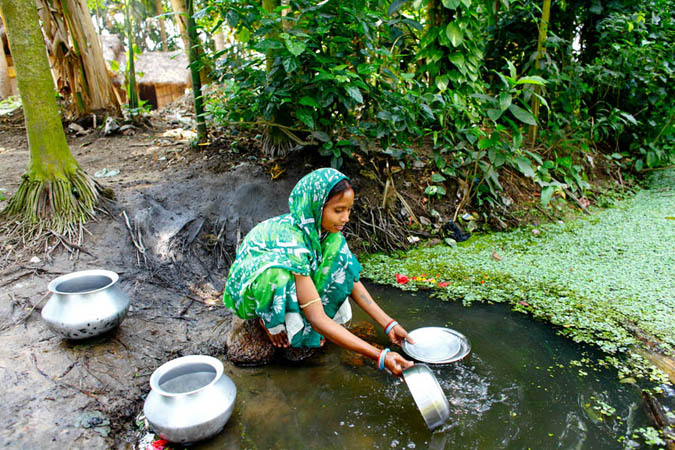
About a billion people risk their health every time they drink water. Children are worst affected by this, says Daniele Lantagne, a drinking water expert from Harvard University. “Every year, 1.8 million children under the age of five die from diarrhea, which is often caused by polluted drinking water.” Only pneumonia kills more toddlers. There have been countless efforts to change
this shameful situation, but with very limited success, says Lantagne.
Polak’s solution for this: let the market remedy it. The rural state of Orissa in India serves as his pilot market. Here, his newly founded company Spring Health wants to sell safe drinking water to customers who earn less than two dollars a day. These are the poorest of the poor according to a frequently used definition, and constitute 2.6 billion potential customers who are hardly
served by anybody because they do not promise any profit. Polak sees this differently.
But in order to reap the profit, he has to solve a mindboggling task. In India alone, 670,000 villages have problems with unsafe drinking water. Even government reports admit as much. Billions of dollars would be needed to serve all these villages – billions that the government does not have. And when the government does invest, the situation often reverts to “normal” again
very quickly.
This is even mentioned in the official reports. But the people of Manikpur Patna don’t need to read these reports to know this. The public hand pump not only dispenses polluted water, laments Bula Sahoo; on top of this it hardly works: “But it was installed only a few years ago.”
The wiry farmer works the lever of the pump with a great deal of effort, but only a trickle exits from the pipe. That’s nothing new for Polak. But when Sahoo tells him about the additional water supply system the authorities installed a couple of years ago, Polak becomes incensed.
The system consists of a groundwater well, an electric pump, a cement storage container and pipes to different villages. It is a luxury that very few places here enjoy. “It didn’t take long for the wires connecting the pump to the grid to be stolen,” says Sahoo, “but nobody showed up to do the repairs.” Polak snarls, “What a waste of money,” and quickly estimates the cost of the ruin. Investment cost is around 800 dollars per family, he calculates, and an additional six dollars in operating costs per day – at least when the system was still running. That is much too costly for a place where most families earn less than four dollars a day.
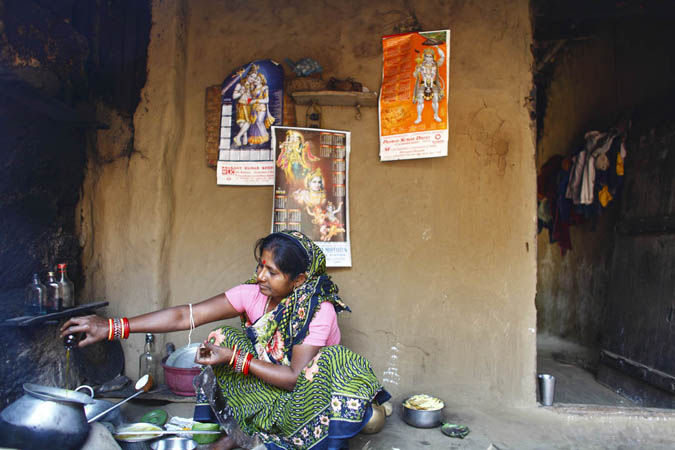
The million-dollar question remains: How can you supply thousands of villages with safe and low-priced drinking water on a sustainable basis? Polak’s answer is as follows: Spring Health produces a chlorine disinfectant from simple saltwater in a hub. The only things needed are an electrode device for 200 dollars and a little bit of electricity. An employee delivers the disinfectant by motorbike to the villages around the hub.
The company has franchise contracts with small village kiosks there, the kirana shops. It supplies these shops with 3,000-liter cement tanks and the disinfectant. Additionally, the company does the marketing. The shop owner fills the tank with water from his well, sells it and gets a 25 percent share of the proceeds. This business model reduces the cost of transport enormously. Instead of hauling around vast quantities of heavy bottles and water, the Spring Health employee uses his bike to shuttle a few liters of chlorine through the Orissa countryside.
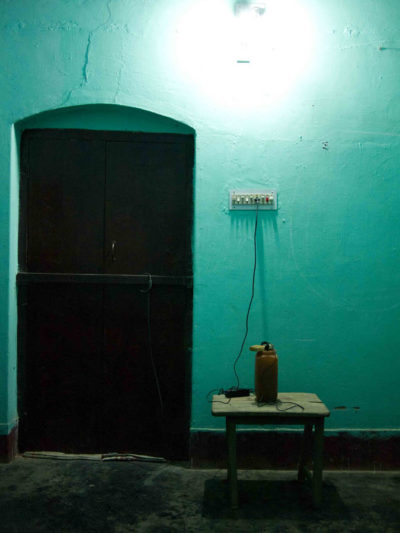
The beta test of the venture has been running with one hub – two dingy rooms – for a year now and a dozen selling points in as many villages.
Daily sales amount to 10,000 liters. The customers buy 10 to 20 liters per family and day at 0.2 rupees per liter – about 0.4 cents. Everybody profits: The customers get safe water at a price they
can afford. They stay healthy, don’t need to spend money on drugs and miss out less on work or school. “
If a kid gets diarrhea, that can cost up to 7,000 rupees,” says Biranji Barahla, a Spring Health customer. “But I earn only 200 to 300 rupees a day.” The shop owners, in turn, increase their sales by 25 percent, and they gain respect in the village because they are supplying safe water to the village. And Spring Health makes a profit.
“Because everybody wins, everybody has an interest in keeping things running,” says Polak. Water expert Lantagne has observed Polak’s beta
test: “Exemplary,” in her estimation. “Paul Polak has studied the circum-
stances in the field very well and he has designed his business model
accordingly.”
Polak became interested in poverty after he just had made a lot of money. He had earned three million dollars with a business in the oil sector and in real estate even though his main occupation at the time was running a psychiatry practice in Denver. During his years as a psychiatrist he became aware of the fact that many depressed people were poor or even homeless. “I began wondering how they could get out of poverty.”
Every time Polak asks a question, he does it in a radical way. He travelled to Bangladesh because he reckoned that there isn’t any other place with poorer people where it could be possible to learn how to survive poverty. Polak started interviewing farmers, tradespeople, rickshaw drivers. He hasn’t stopped since. In the last 30 years he has surveyed 3,000 people. “I have learned more from them than from any other thing I have done in life.” For instance, his main principle to alleviate poverty: poor people have to find ways to earn more.
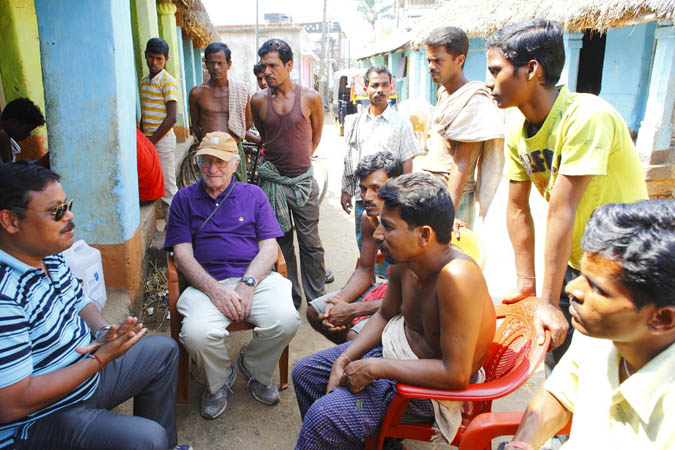
What may sound like circular reasoning to many became Polak’s maxim that dictated the rest of his life. “I was told many times that I am crazy,” he remarks. “So what? I have always broken the rules.” In Bangladesh, he realized what the farmers needed to earn more: irrigation pumps that liberated them from the vagaries of the rain. However, this pump had to be much cheaper than anything on the market. That was a seemingly impossible task – exactly the right problem for Polak to tackle.
He didn’t reopen his practice in Denver. With two million dollars from his earnings, he founded an organization called International Development Enterprises (IDE). It is no coincidence that its name contains the term enterprise. Even back then, Polak counted on the markets. “We need to create markets in which the poor can participate – as customers and entrepreneurs.” He thinks if recipients of charity become customers they will in turn regain
their dignity.
Polak had a treadle pump developed that consisted of bamboo and tin and cost 25 dollars. This price was unrivaled, yet it was possible without any subsidies. The pump tripled the annual income of many farmers and created jobs in rural areas because artisans in the villages could produce the pump and repair it. IDE helped start production and the supply chain. Additionally,
the organization invested in marketing. This was the only activity that was subsidized, because the tradespeople couldn’t afford to pay for it.
The Swiss development agency Deza invested 5.5 million dollars in the marketing, and in the following years two million farmers bought a treadle pump. The resulting increase in crop yields reached one billion dollars. And all this happened in a country that was considered to be a hopeless cause, says Urs Heierli. He was the director of Deza in the late 1980s and sponsored Polak’s treadle pump project.
The treadle pump is now also sold in other countries, including India, Vietnam and Nepal. Additionally, IDE diversified its range of products. For instance, it markets simple irrigation systems. All of these products are subject to Polak’s rule of radical affordability. Otherwise, the poor could not afford them. “Polak has made many an engineer seethe with rage until the product to be developed was cheap enough,” says Heierli.
The result of all this is that some 17 to 20 million farmers escaped poverty with Polak’s treadle pumps and irrigation systems. “He has helped about the same number of people as Muhammad Yunus, one of the inventors of micro credits,” says Heierli. “As is well known, Yunus was awarded the Nobel prize.”
It is hard, though, to imagine Polak as a dignified laureate. He may be a brilliant speaker, he certainly isn’t known for his charm. Nobody escapes his pungent sarcasm, not even a potential investor. But it is not in conference rooms that he is in his element but rather out in the villages doing field work: listening to women, and interviewing farmers to refine his business model.
His curiosity is as tireless as his legs. An employee says that IDE had to organize his field workers in two shifts in order to cover Polak’s working day. After the last co-worker has left, exhausted, Polak continues thinking about his project over dinner, dashes off e-mails or twitters on “Out of Poverty».
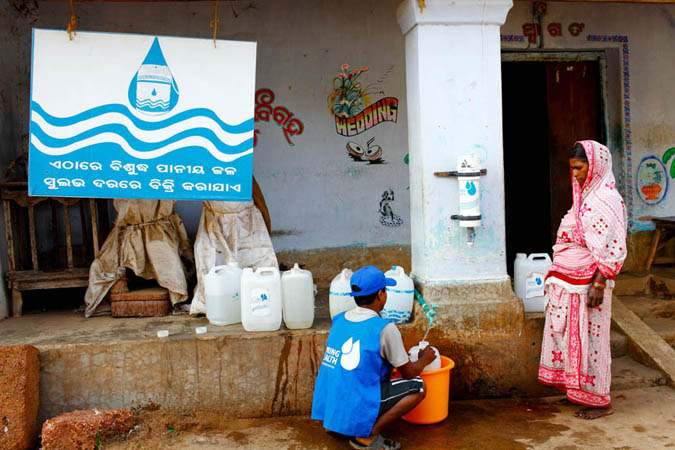
In the water project the free market approach is to take even more center stage. Polak doesn’t want a single rupee in subsidies. The business is supposed to be completely self sustainable. That’s why he founded Spring Health and hired half a dozen employees to run the beta test.
Polak supervises it, and divides his time between his wife in Denver, occasional visits to his grandchildren and the research trips to Eastern India. Sometimes he rushes from there to Bangalore. Spring Health needs more money to get the expansion started. Three years from now, Polak plans to service 10,000 kirana shops.
This drive follows another of these rules of his that he always delivers energetically: “If your product isn’t going to change the lives of
at least 100 million poor people – don’t bother,” he tells a potential investor at a meeting. Again, Polak wears a faded polo shirt – soaked with sweat to boot. An associate’s car has broken down in the middle of a congested four-lane highway on the way to the meeting. Polak got out of the car without
batting an eyelash and in the sweltering tropical heat helped push the car onto a side road.
A day later, he is already back roaming the dirt roads of rural Orissa, which seems to be light years away from the boom town of Bangalore. There are still problems to be solved. For instance, initially, the shops didn’t attract any customers living outside a radius of 50 yards.
The scheme to overcome this invisible boundary can be observed in the village of Gaudapatana: It goes by the name of Suresh Mahapatra. The teenaged boy wears a classy blue cap and vest adorned with the Spring Health logo and rides a rickety bicycle. Two jerrycans hang from the handle bar, another two from the rack: Mahapatra is on a delivery errand.
“Pani,” he shouts, “water,” before he knocks at the door of a home. It opens a bit. A woman, wrapped in a sari, takes a jerrycan out of his hand. This delivery service costs an extra two cents. “Fetching water is a women’s domain,” explains Polak, “and we only found out by chance that they don’t
venture far from their homes, because that violates conventions.”
The home delivery service has solved some other problems as well. The carriers now serve also these villages that are too small to get their own tank. And they supply water to the Dalit as well. These are India’s indigenous tribes that didn’t even get access to the lowest ranks in the caste system. Many Dalit don’t dare to leave their straw huts and enter the village proper for fear of being intimidated there. When a Dalit once went to fetch water at the shop
anyhow and touched the tap in the process, the shop owner had to empty the whole tank and clean it thoroughly. Otherwise, the members of the higher caste would boycott the shop.
Most people wouldn’t touch this difficult market with a ten-foot pole, but Polak has turned it into a business. The invention of the home delivery scheme has increased the water sales by 50 percent. “Profit will drive us into the furthest corners of this country.”
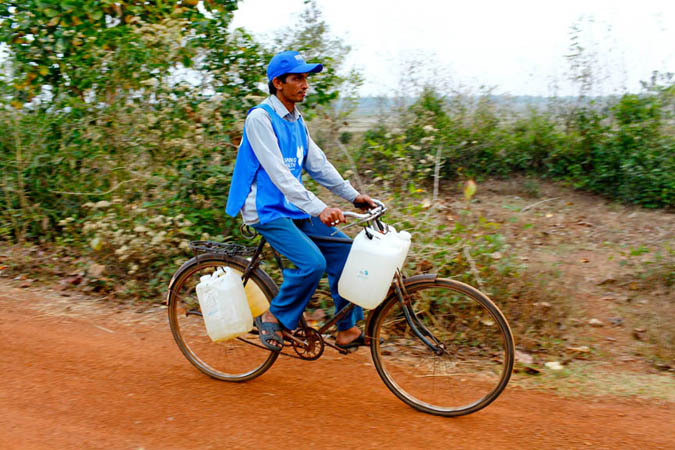
In spite of the successful beta test and his brisk rhetoric, Polak stays realistic. “Our business model can still fail; we are only at the beginning.” There are plenty of cautionary tales that demonstrate how difficult the rural water market in developing countries is. Procter & Gamble tried to introduce a chlorine-based water treatment product in small packets to the markets of several countries. Although the company only wanted to earn a small profit, the business failed.
Even a simple water treatment method that doesn’t cost anything is spreading only very slowly. Called Sodis, it was developed by Swiss researchers. Water in transparent plastic bottles is placed in sunlight for a few hours. The sun’s heat and the UV-radiation sterilize the water. “It is difficult to change people’s behavior,” says water expert Lantagne. Many people don’t make a connection between polluted water and diarrhea. That is why they don’t see why they should pay for safe water or go to any lengths to sterilize it, for instance, putting it into plastic bottles on top of their roofs.
“Poor customers are especially critical,” says Polak. “If a father puts a dollar on the line, the family may have to pay for this by starving.” Spring Health tackles this dilemma with a mixture of education and marketing. When its employee Amitav Swain rides his bike to the villages to deliver the chlorine solution, he often takes test samples from the wells. Like he did with the open well on the market place of Taraboi in whose milky waters a lazy turtle lives. “I show the people the bacteria in the petri dishes to make them aware of how dirty
the water is.”

The classy uniforms of the delivery boys and the advertising murals on the village houses are part of the classic marketing. If somebody thinks that this is an expensive luxury, they are dead wrong, says Polak. “The poor are no different from us. Everybody wants to buy what their neighbor just bought.” The brands wield their power even in rural Orissa.
Polak wants to use this power not only for the water business. He has plans to market other products under the label of Spring Health. He has a nutritious lime drink in mind that contains micronutrients, vitamins, and is sold in a dry package – a typical Polak recipe. His company will make additional profits and fight the widespread malnutrition of kids at the same time.
Polak says that this example emphasizes the difference between social and traditional businesses. “Pepsi and Coca-Cola sell expensive sugar pop and support some social projects as an offset.” But products of social businesses have the benefit for society built into them. That’s why he doesn’t see any problems associated with making a profit – quite the contrary.
“There are a billion people globally that don’t have access to safe drinking water. We cannot serve this market alone.” Instead, Perrier & Co. have to realize that they are missing a huge opportunity. “That will only happen when we can show that there is money in this.” Polak contends that the entry into this market will change the big corporations for good. “They have to learn that you must not plan top-down, but listen to the customers at the bottom.” He thinks that whoever misses this point will go down. “Just think of the dinosaurs in Detroit. They barely escaped ruin because it took them so long to learn what kind of cars are needed today.”
Harsh words, fanciful visions – Paul Polak would be the last person to deny this. And he would not be Polak if he wouldn’t counter this criticism with more grand words: “I earned three million dollars in a side business – that means I know how to make money. Now, I want to use this talent to help others
escape from poverty.” And for once, the apostle of free markets uses
an ethical argument to make his case for why he can’t stop his crusade
against poverty even at the age of 77: “If you fail to reach your potential in life, that’s what I call sin. ◁
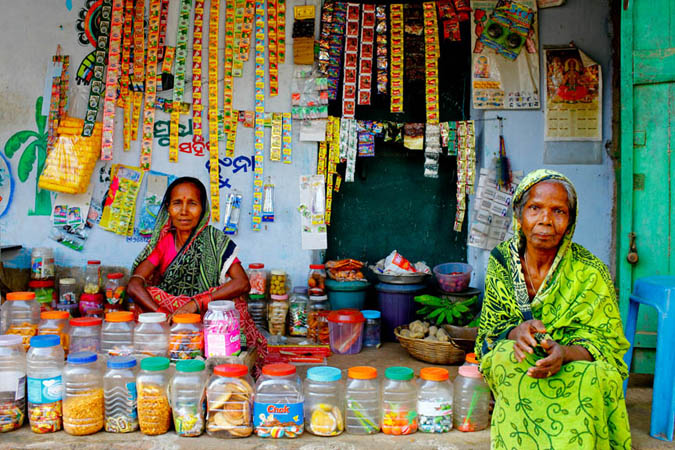
This story was originally published in the German magazine brand eins. Read the German version on their website.
